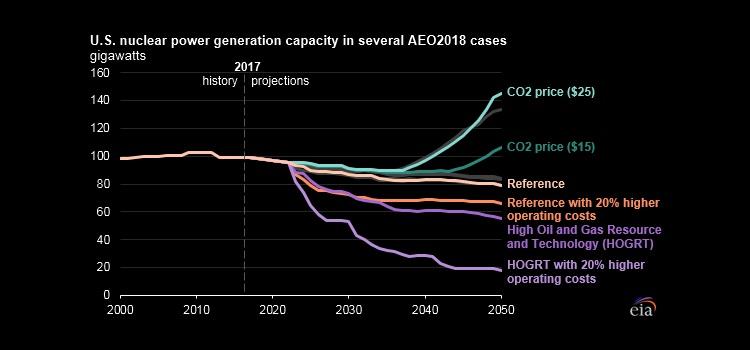
U.S. WITHOUT NUCLEAR

PLATTS - The Department of Energy has not forgotten about the plight of at-risk coal and nuclear plants, but suggested that states should craft their own programs as a workable federal solution continues to elude the department, Energy Secretary Rick Perry said.
"We're looking for the answer to a question that vexes us at the moment," Perry said Wednesday at the CERAWeek by IHS Markit conference in Houston.
Over a year has passed since the Federal Energy Regulatory Commission rejected the Trump administration's original plan to prop up coal and nuclear generators with a notice of proposed rulemaking (RM18-1) from DOE that sought to guarantee full cost recovery and a return on investment for generators with 90-day on-site fuel supplies.
Since then, continued federal efforts to curb retirements of coal and nuclear units for resilience and national security have met with much resistance and found little success.
'THROWN A LOT OF JELL-O'
"I've thrown a lot of Jell-O at the wall on this, and I'm trying to find some solutions that we can all, or at least the majority of us, can get behind," Perry said.
As the administration continues to seek options for keeping struggling coal and nuclear plants afloat, Washington insiders have grown increasingly skeptical that action at the federal level to keep baseload generation online can find a legal foothold.
Too many unanswered questions, such as which plants should get funding and where would the money come from, have stood in the way of crafting a legally justifiable plan that White House advisers could support.
"I think it's just going to be very difficult to do anything on the federal level, although I think the administration is going to continue to try," Barry Worthington, executive director of the United States Energy Association, said in an interview. "Maybe they will find a formula that does work," he said, but so far it has been "very hard to find a path that would hold up in court."
STATES MUST STEP UP
Possibly the biggest impediment to aiding coal and nuclear plants is that these retirements are in line with how the wholesale power markets are supposed to work, with lower-cost facilities causing higher-cost resources to exit the market. Those market fundamentals don't track with the president's campaign promises, or certain communities' need for a thriving coal fleet for job and economic purposes.
In the meantime, rural communities dependent on tax revenues from coal plants and mining operations are being devastated as these facilities close. "I think the states are going to have to say, sooner or later, 'the feds can't bail us out. There's not any legal, legislative, or regulatory path for the feds to take action. It's going to be up to us to do something,'" Worthington said.
Illinois, New York and New Jersey turned to zero emissions credits programs to save their nuclear fleet, and Pennsylvania lawmakers recently introduced legislation to move in that direction as well.
Worthington said coal-producing states may look to craft programs to help coal units. Wyoming, for instance, passed a law earlier in the month requiring utilities to look for buyers for their coal units before retiring them.
Perry offered that it was "pretty wise" for states to seek "control of [their] economic destiny" and have conversations about whether certain industries in the state are worth subsidizing or supporting.
"I support those types of thoughtful competitive programs for states," he added. States "don't have to rely on the federal government to support a particular industry sector."
-----
Earlier:

2019, March, 15, 09:55:00
U.S. COAL DOWNThe U.S. Energy Information Administration is expecting domestic coal-fired power generation this year to reach its lowest level in over 70 years. |

2019, March, 15, 09:45:00
U.S. NUCLEAR FOR INDIAThe U.S. has agreed to build six nuclear power plants in India, according to a joint statement from the two countries issued March 13 in Washington, D.C. |

2019, March, 4, 10:45:00
U.S. WILL LOSE NUCLEARThe USA risks losing a substantial portion of its nuclear power capacity unless it takes policy action, International Energy Agency Executive Director Fatih Birol told the US Senate |

2019, January, 14, 11:05:00
U.S. NUCLEAR FOR AFRICAISSUES - Yet the United States still has an opportunity to help interested African nations overcome the obstacles to realizing their energy ambitions. Whereas Russia and China have large government investments in a few advanced nuclear technologies, the United States has a robust and thriving private sector for advanced nuclear development, drawing on both decades of public research and development and a high-tech investment ecosystem. From large national laboratories to small venture-backed start-ups, the United States has over 50 firms working on a diverse portfolio of advanced nuclear designs, many targeting smaller or niche markets. |

2018, December, 21, 13:45:00
U.S. THERMONUCLEAR PARTICIPATIONWNN - The USA should continue its participation in the International Thermonuclear Experimental Reactor (ITER) project and develop a national research programme towards building a compact pilot plant, according to the National Academies of Sciences, Engineering, and Medicine (NASEM). |

2018, November, 14, 11:45:00
U.S. NUCLEAR CAPEX DOWN 40.8%WNN - in 2017 the average total generating cost - which includes capital, fuel and operating costs - for nuclear energy was USD33.50 per megawatt-hour (MWh). |

2018, November, 12, 11:45:00
POLAND, USA NUCLEARWNN - Poland and the USA have signed a Joint Declaration of Energy Security, which emphasises the expansion of their cooperation in a variety of areas, including civil nuclear energy. The document was signed in Warsaw yesterday by Polish Energy Minister Krzysztof Tchórzewski and US Secretary of Energy Rick Perry. |

2018, October, 15, 12:20:00
U.S. - CHINA NUCLEAR POLICYWNN - The US Department of Energy (DOE) has established a new policy framework on civil nuclear cooperation with China, following a government policy review led by the US National Security Council. The policy covers exports of technology, equipment and components, and material to China. |












